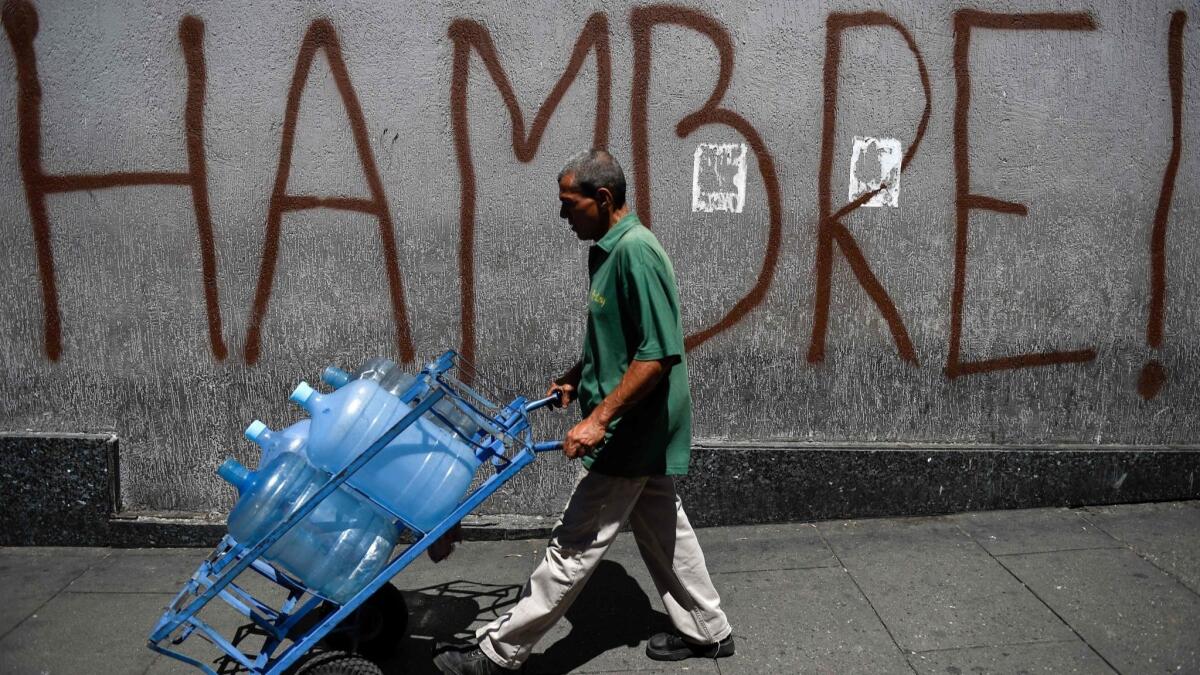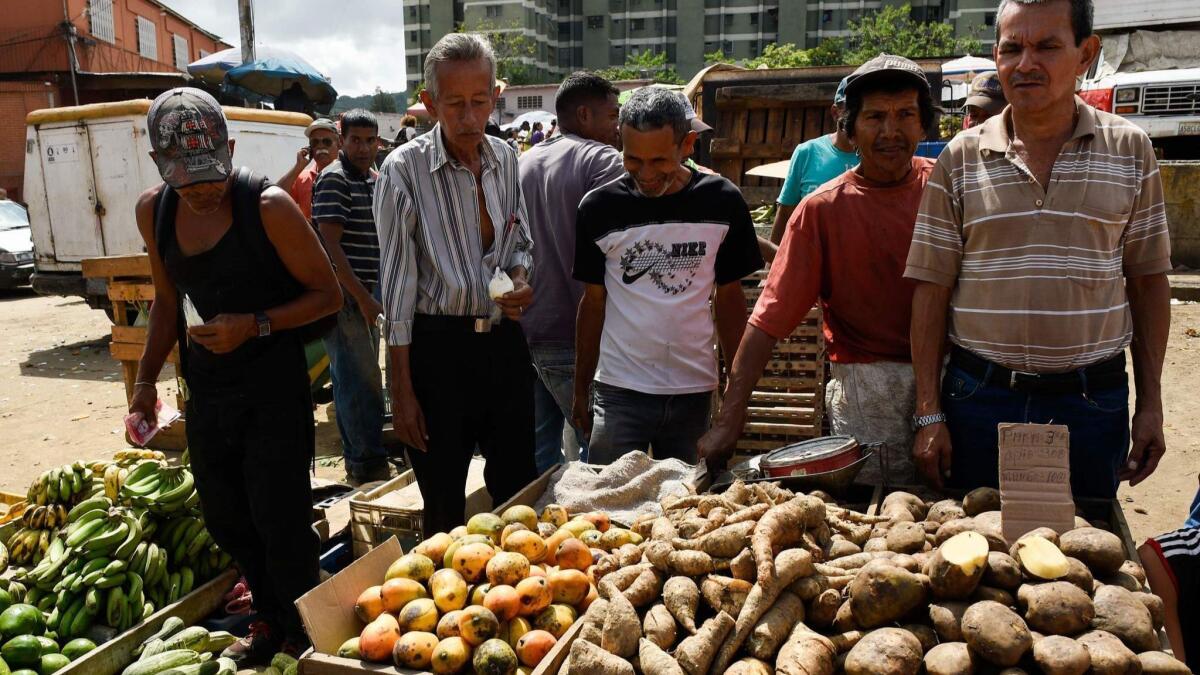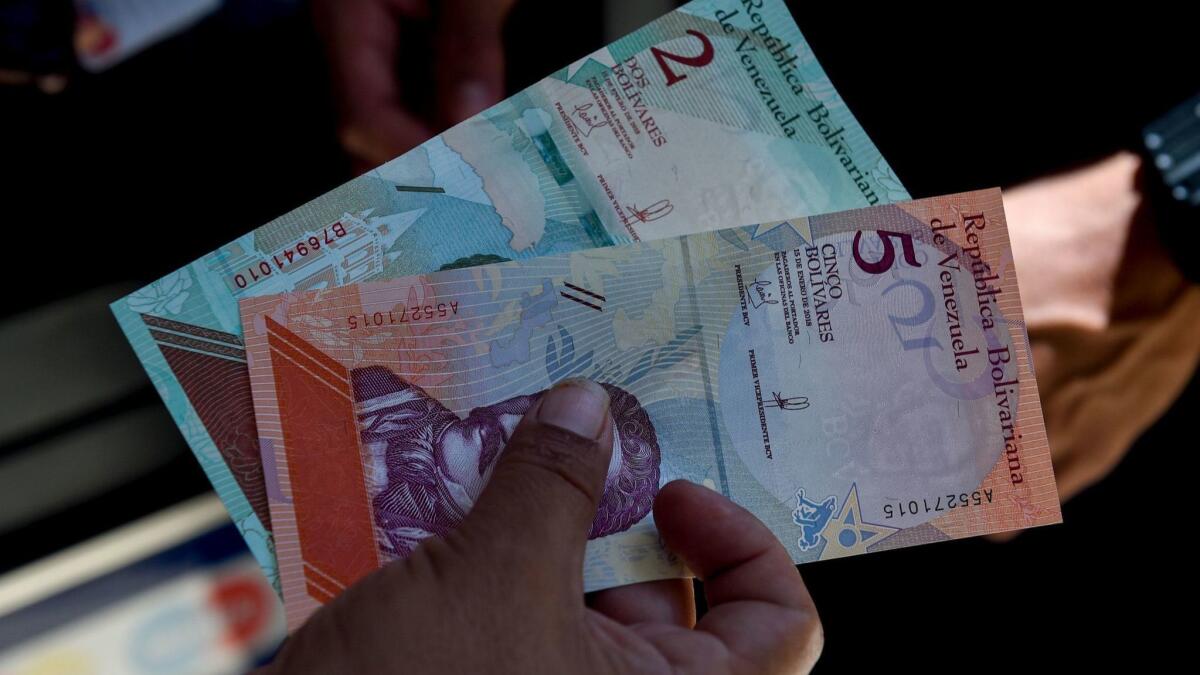Inflation approaches 1 million percent. The minimum wage will rise 3,500%. This is today’s Venezuela

- Share via
Reporting from Caracas, Venezuela — Maria Celeste Molina warily pulled cash from a downtown ATM and stuffed the bolivars in her purse. Come tomorrow, she had no idea what they might buy.
“I need the cash to travel tomorrow,” the 24-year-old university student said. “But I don’t know if there will be public transport or how much the new fares will be.”
Across this economically hollowed-out country where inflation is approaching 1 million percent and food, medicine, jobs and money are in short supply, residents worried anew as Venezuela’s president hit what many here see as the panic button Monday in an effort to restart a country that once thrived with opportunity.
The nation’s currency — the bolivar — will be devalued, sales taxes increased and minimum wages hiked more than 3,500%, drastic adjustments that President Nicolas Maduro said he hoped would jump-start the economy.
Critics, though, predicted the worst, saying the measures are bound to fail because of rampant corruption in the country, low productivity and crippling U.S. sanctions. Business owners said they can’t possibly afford the 3,670% increase in minimum wages that Maduro requested, and trade groups immediately called for a nationwide strike Tuesday to protest the measures.

The immediate impact of the measures was difficult to gauge, as Monday was declared a holiday by Maduro so that officials could quickly adjust to his plan. Traffic was light in downtown Caracas and many streets in the capital were reported to be deserted.
Although Venezuela boasts enormous oil riches, crude production — the source of 90% of the country’s exports — has been in steady decline over the last decade. Due to a lack of spare parts and the loss of workers who’ve headed for the borders in search of better lives, the country’s refineries are operating at only one third capacity and — once unthinkable — fuel is now being imported.
Throughout the economy’s slow descent, Maduro, who took power in 2013 following the death of his predecessor and mentor Hugo Chavez, has blamed the United States for waging an “economic war” against his country, citing sanctions that have blocked access to banking and hampered Venezuela’s ability to purchase oil field and refining equipment.
“We are going to dismantle this perverse capitalist neo-liberal war and install a virtuous economic system [that is] balanced, sustainable, healthy and productive,” Maduro said Sunday night in a televised address from Miraflores, the presidential palace.
But critics say the moribund economy is a reflection of the socialist economic model installed by Chavez: Price controls, import duties and nationalization of companies that were then turned over to inexperienced worker cooperatives all combined to undermine Venezuela’s once-robust productivity
Moreover, Venezuelan productivity in sectors as varied as dairy products and auto manufacturing has been devastated in recent years as the workforce flees. An estimated 2.5 million people, or roughly 7% of the 31 million people who lived in Venezuela in 2016, have poured into Brazil, Colombia and other nearby countries. Social services such as education and healthcare have also been hurt by the departure of teachers, nurses and doctors.
Once welcomed, the Venezuelan migrants are now finding that countries like Peru and Ecuador are tightening their borders, saying they can no longer cope with the crush of humanity. At the Brazilian border town of Pacaraima, citizens attacked a migrant camp over the weekend after a reported stabbing.
Suely Campos, the governor of the Brazilian border state of Roraima, ordered a temporary closing of the border with Venezuela and asked the federal government to send security reinforcements to deal with what she described as “an increase in criminal activity” in the face of rising Venezuelan immigration.
Tensions have risen within Venezuela since an Aug. 4 drone attack on Maduro as he spoke at a military gathering in Caracas. He emerged unhurt from the assassination attempt, which involved two drone-carried bombs that injured seven military personnel.
Maduro blamed the assassination attempt on “right wing” dissidents and paramilitaries whom he said were led by former Colombian President Juan Manuel Santos. Santos, who left office Aug. 7, dismissed the charges as “absurd.”
Nevertheless, the Maduro-controlled supreme court has requested the extradition of opposition congressman Julio Borges and former attorney general Luisa Ortega Diaz from Colombian exile as alleged conspirators. National Assembly member Juan Requesens has already been jailed on charges of “attempted magnicide.”

But for Venezuelans on the street, the major concern is simply surviving another day amid scarcities of food and cash. As he unveiled his new measures, Maduro claimed that a solution could lie in a confusing new currency that will be tied to the virtual “petro” currency whose value in turn is tied to oil reserves.
Exactly how the new currency will affect prices and whether it will halt Venezuela’s rampant hyperinflation is unknown. The “new” bolivar is the same as the previous one — but minus five zeros. Currency markets both inside and outside Venezuela were reported to be chaotic amid the uncertainty, with the value of one U.S. dollar tripling in some cases to 6 million of the old bolivars, or 60 new bolivars to the dollar.
In a bid to quiet potential domestic unrest amid the galloping inflation that has devastated Venezuelans’ purchasing power, Maduro on Friday announced a new set of price controls and a rise in the minimum wage to 180 million bolivars per month, up from 5.2 million. Maduro promised in his address that the government would make up the difference if companies couldn’t come up with the higher wages.
Oil workers union leader Ivan Freites, who is a leader of the strike, said that the new measures will only put more Venezuelans out of work. “Maduro says he will pay the salaries of private sector workers, but we ask how will he do it if the state is broke?”
Antonio Souza, owner of a restaurant in the Venezuelan city of Barquisimeto, said he has no option but to close his eatery and let his 12 workers go.
“I can’t deal with a wage increase of the magnitude that the government approved,” Souza said in a telephone interview. “How high would I have to raise prices to make up for the losses? It’s an unsustainable situation.”
Maduro offered no solutions for healing Venezuela’s oil industry, which generates the lion’s share of revenue needed to keep the government running and to fund its social programs. Lower crude prices over the last three years and the decline in the country’s oil output have added to Maduro’s money crisis.
Special correspondents Mogollon and Kraul reported from Caracas and Bogota, Colombia, respectively.
More to Read
Sign up for Essential California
The most important California stories and recommendations in your inbox every morning.
You may occasionally receive promotional content from the Los Angeles Times.










